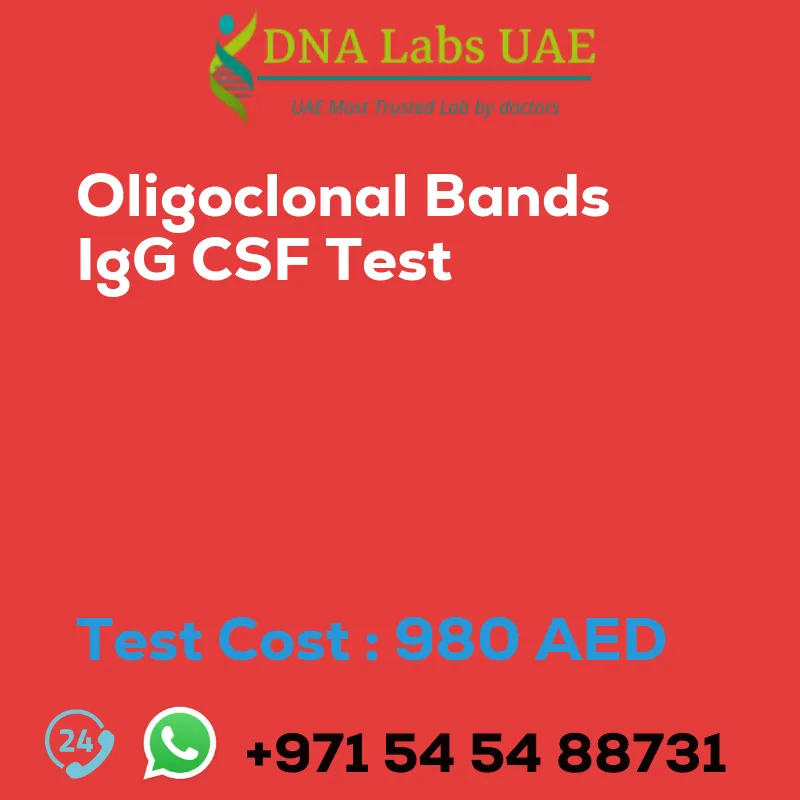OLIGOCLONAL BANDS IgG CSF Test
Cost: AED 980.0
Test Name
OLIGOCLONAL BANDS IgG CSF Test
Components
Price: 980.0 AED
Sample Condition
2 mL (1.5 mL min.) CSF in a sterile screw capped container. Ship refrigerated. DO NOT FREEZE.
Report Delivery
Sample Daily by 9 am; Report Next day
Method
Isoelectrofocusing
Test type
Multiple Sclerosis
Doctor
Neurologist
Test Department
ELECTROPHORESIS
Pre Test Information
No special preparation required
Test Details
The Oligoclonal Bands IgG CSF test is a diagnostic test used to detect abnormal protein bands in the cerebrospinal fluid (CSF) that indicate inflammation or immune activity in the central nervous system.
In healthy individuals, the CSF contains a small amount of immunoglobulin G (IgG) proteins, which are produced by plasma cells in the brain and spinal cord. However, in certain neurological conditions, such as multiple sclerosis (MS), there may be an increase in the production of specific IgG antibodies in the CSF.
The Oligoclonal Bands IgG CSF test involves separating the proteins in the CSF using a technique called electrophoresis. The separated proteins are then stained with specific antibodies that bind to IgG antibodies. If there are abnormal bands present, it indicates the presence of oligoclonal bands, which are a marker of inflammation or immune activity in the central nervous system.
The presence of oligoclonal bands in the CSF is not specific to any particular disease, but it is commonly seen in MS. However, oligoclonal bands can also be seen in other conditions such as infections, autoimmune disorders, and certain types of cancer that affect the central nervous system. Therefore, the test is often used in combination with other clinical and diagnostic tests to help diagnose and monitor the progression of neurological conditions.
It is important to note that the Oligoclonal Bands IgG CSF test is not a definitive diagnostic test for any specific condition and should be interpreted in conjunction with other clinical and diagnostic findings. A neurologist or healthcare provider is best equipped to interpret the results of this test and provide appropriate treatment recommendations.
| Test Name | OLIGOCLONAL BANDS IgG CSF Test |
|---|---|
| Components | |
| Price | 980.0 AED |
| Sample Condition | 2 mL (1.5 mL min.) CSF in a sterile screw capped container. Ship refrigerated. DO NOT FREEZE. |
| Report Delivery | Sample Daily by 9 am; Report Next day |
| Method | Isoelectrofocusing |
| Test type | Multiple Sclerosis |
| Doctor | Neurologist |
| Test Department: | ELECTROPHORESIS |
| Pre Test Information | No special preparation required |
| Test Details |
The Oligoclonal Bands IgG CSF test is a diagnostic test used to detect abnormal protein bands in the cerebrospinal fluid (CSF) that indicate inflammation or immune activity in the central nervous system. In healthy individuals, the CSF contains a small amount of immunoglobulin G (IgG) proteins, which are produced by plasma cells in the brain and spinal cord. However, in certain neurological conditions, such as multiple sclerosis (MS), there may be an increase in the production of specific IgG antibodies in the CSF. The Oligoclonal Bands IgG CSF test involves separating the proteins in the CSF using a technique called electrophoresis. The separated proteins are then stained with specific antibodies that bind to IgG antibodies. If there are abnormal bands present, it indicates the presence of oligoclonal bands, which are a marker of inflammation or immune activity in the central nervous system. The presence of oligoclonal bands in the CSF is not specific to any particular disease, but it is commonly seen in MS. However, oligoclonal bands can also be seen in other conditions such as infections, autoimmune disorders, and certain types of cancer that affect the central nervous system. Therefore, the test is often used in combination with other clinical and diagnostic tests to help diagnose and monitor the progression of neurological conditions. It is important to note that the Oligoclonal Bands IgG CSF test is not a definitive diagnostic test for any specific condition and should be interpreted in conjunction with other clinical and diagnostic findings. A neurologist or healthcare provider is best equipped to interpret the results of this test and provide appropriate treatment recommendations. |








